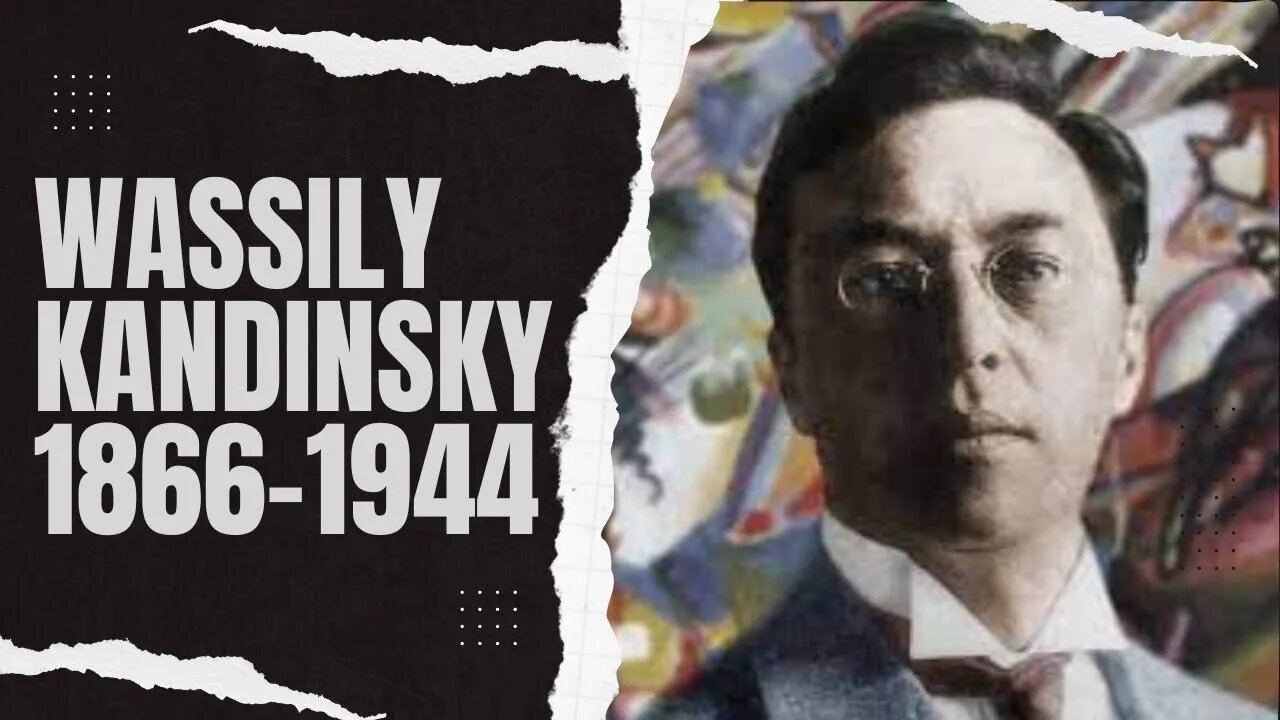Premium Only Content

Wassily Kandinsky : The Father of Abstract Art #art #artist
Wassily Kandinsky : The Father of Abstract Art #art #artist
In this video, we explore the life and work of Wassily Kandinsky, the artist widely regarded as the father of abstract art. From his early training in Moscow to his later years in Germany, Kandinsky's artistic journey was a remarkable one that revolutionized the world of art. We delve deep into his signature style, examining the use of line, color, and form that defined his work. We also take a look at some of his most famous paintings, such as "Composition VIII" and "Yellow-Red-Blue," which have become iconic pieces in the abstract art genre. Through interviews with art experts and historians, we explore the significance of Kandinsky's contribution to the art world, and how his legacy continues to impact artists today. Whether you're a seasoned art lover or a curious beginner, this video is a must-watch for anyone interested in the history of abstract art and the trailblazer who started it all. Don't miss out on this fascinating exploration of one of the most influential artists of the 20th century.
#Kandinsky #AbstractArt #ArtHistory #Expressionism #ModernArt #ArtMuseum #ArtGallery #RussianArt #ColorTheory #AvantGarde #ArtEducation #ArtAppreciation #Artists #ArtLovers #ArtWorld #FineArts #Paintings #CreativeMinds #ArtHistorians #Artsy
History is a broad term that refers to the study and interpretation of past events and their significance to the present day. It encompasses the actions, beliefs, and experiences of human beings throughout time, as well as the physical artifacts and records that document these events. The study of history helps us to understand how the world we live in today has been shaped by past events and how we can learn from them.
The importance of history cannot be overstated. By examining past events, we can learn from the successes and failures of those who came before us, and apply this knowledge to our own lives and society. It helps us to understand the roots of current political, economic, social, and cultural issues and how they have evolved over time. History can also help us to appreciate the diversity of human experience and the many ways in which people have interacted with one another throughout history.
One of the key methods used in the study of history is the interpretation of primary sources. These can include written records, such as letters, diaries, and official documents, as well as physical artifacts like artwork, tools, and architecture. By examining these sources and analyzing them in context, historians can gain insights into the beliefs, values, and motivations of past peoples and societies. This can help us to understand the complexities of human behavior and decision-making, as well as the impact of larger social, economic, and political forces.
Another important aspect of the study of history is the consideration of multiple perspectives. This involves taking into account the viewpoints of different groups of people, such as women, minorities, and those who have been historically marginalized or excluded from mainstream narratives. By doing so, historians can gain a more complete picture of past events and the ways in which they have affected different communities.
In addition to its academic importance, history also plays a crucial role in shaping our collective memory and identity as a society. By remembering and commemorating important events and figures from the past, we can create a shared sense of history and belonging. This can help us to build stronger communities and foster greater empathy and understanding between different groups of people.
Overall, the study of history is essential for understanding ourselves, our world, and our place in it. Through careful analysis of past events and sources, we can gain insights into the complexities of human behavior and decision-making, appreciate the diversity of human experience, and learn from the successes and failures of those who came before us.
-
 3:38
3:38
A Small Part of History
17 days ago $0.04 earned"Unveiling the Legacy of Otto Wöhler: The General of Infantry Who Shaped History (1894-1987)"
492 -
 29:44
29:44
Standpoint with Gabe Groisman
7 hours agoEP. 59. The State of Western Militaries Today. Col. Richard Kemp
25.6K -
 47:24
47:24
Candace Show Podcast
3 hours agoConor McGregor: GUILTY—But Of What? | Candace Ep 111
68.5K163 -
 13:19
13:19
Josh Pate's College Football Show
4 hours agoThe SEC has COLLAPSED!! Updated CFP Picture with Josh Pate
1.05K -
 45:59
45:59
PMG
19 hours ago"Hannah Faulkner and Sabrina Cardone | Empowering the Next Generation"
7801 -
 1:19:57
1:19:57
Awaken With JP
8 hours agoThanksgiving for America Special - LIES Ep 67
104K26 -
 3:58
3:58
Blackstone Griddles
1 day agoLeftover Turkey with White Country Gravy
41.8K3 -
 42:19
42:19
Lights, Camera, Barstool
11 hours agoDoes 'Glicked' Meet The Hype? 'Gladiator II' And 'Wicked' Reviews
37.1K2 -
 1:28:03
1:28:03
MTNTOUGH Fitness Lab
4 hours agoRandy Newberg's Shot of a Lifetime: The Intense 5-Second Window for a Trophy Ram | MTNT POD #91
21.1K2 -
 1:02:44
1:02:44
World Nomac
11 hours agoThe side of Las Vegas they don't want you to know about
17.1K1